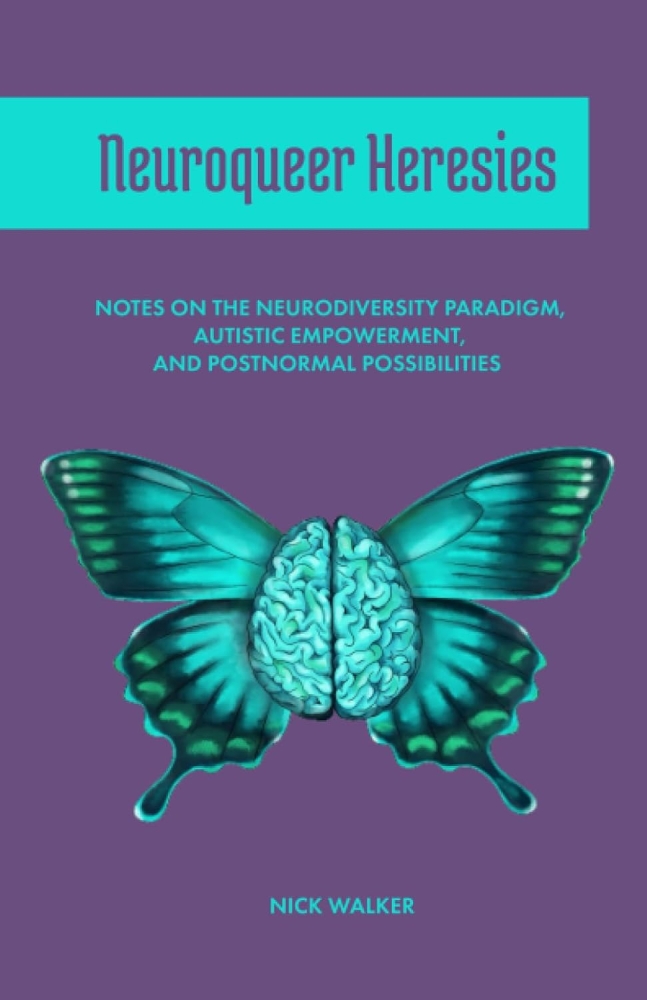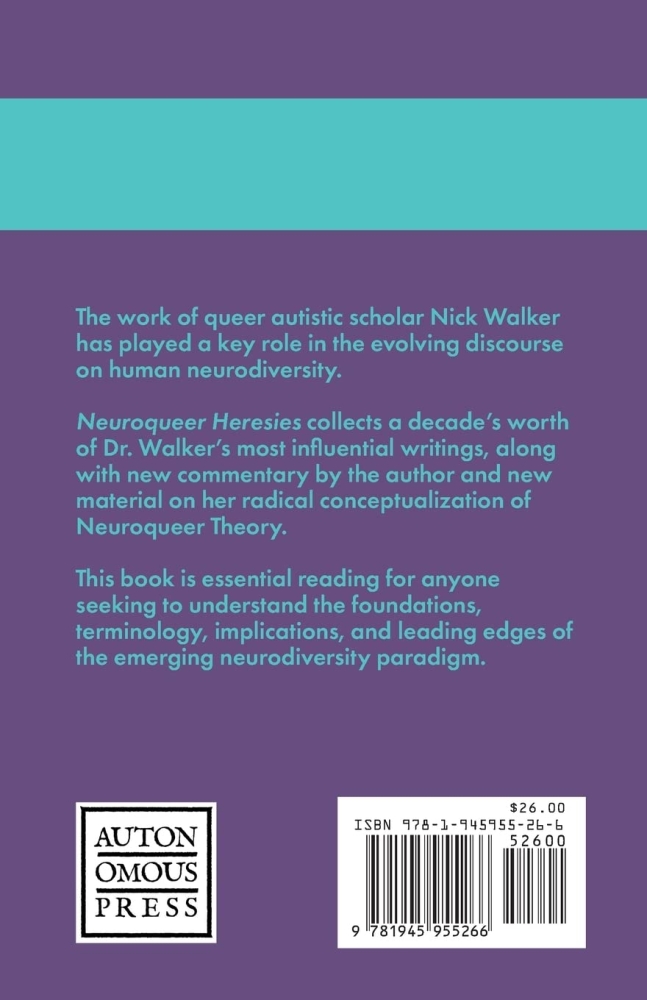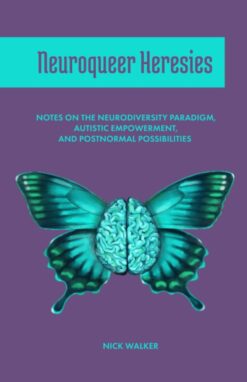Editorial Reviews
About the Author
Nick Walker is a queer, transgender, flamingly autistic writer and educator best known for her foundational work on the neurodiversity paradigm, her development of the term neuroqueer and the concept of neuroqueering, and her contributions to fostering the emergent genre of neuroqueer speculative fiction. She is a professor of psychology at California Institute of Integral Studies, and senior instructor at the Aiki Arts Center in Berkeley.Dr. Walker is co-founder and Managing Editor of the worker-owned indie publishing house Autonomous Press, and has co-edited and contributed to multiple volumes of the annual Spoon Knife neuroqueer lit anthology published by Autonomous Press’ NeuroQueer Books imprint.Along with her co-writer Andrew M. Reichart and artist Mike Bennewitz, Dr. Walker is part of the creative team behind the urban fantasy webcomic Weird Luck.







S23M –
‘Neuroqueer Heresies’ is urgently needed in a world that is still dominated by the corporate co-opting of the neurodiversity paradigm, and by conversion “therapies” that have only one goal: turning the fears of parents and the trauma of neurodivergent people into profits. The introduction and consistent use of new language and new semantics is the most powerful tool at our disposal.Over the course of many years Nick Walker has meticulously documented the origins and semantics of the evolving language that is co-created within autistic culture. The result has been a stable and trustworthy linguistic platform on top of which others have been able to build and continue to build.Corporations can co-opt individual words, but they can’t co-opt the entire language system of the neurodiversity movement without revealing their colours as part of the attempt. Onwards! Autistic people co-create Autistic culture every day, and it is recorded and made visible one publication at a time.
Cosmia –
I’ll start with just one caveat. I am autistic, and I absolutely believe my autism would still be a disability in even the most inclusive and accepting society. However, I love looking at this particular disability through Dr. Nick’s lens of Neuroqueering. The social and anthropological aspects of how autistic people have traditionally been treated and regarded is completely accurate. I just kind of like to urge people to hold space for the fact that societal mistreatment is not the only thing that makes autism a disability. I do think modern society can make a lot of us appear more disabled than we would be if we had all the supports in place that we needed. Also the parallels and intersections between autism and queerness are one of my favorite things to explore in the world, and this book did it beautifully. Overall, an amazing read and I recommend it for autistic people and their loved ones. Also, I am all for fighting alongside allies and caregivers of autistic people who need more support than me. I believe in the liberation of ALL of us, regardless of support needs. But that’s just me.
Jia-Li –
You may have read some of these essays on neurocosmopolitan or somewhere else, but this includes insightful updates and commentary on those classic pieces and it’s wonderful to have them all combined in a print edition. The cover feels nice too.
RBSeattle –
I wish I had this book to guide me thirteen years ago as my fight against the pathology paradigm began. I’m sending it to all of my friends who are raising autistic children in our ableist society . Beautifully written book.
A. Maez –
I enjoyed reading this book. It is liberating and not just for neurodivergent people. It explains the neurodiversity paradigm in a way that is accessible to everyone. It makes clear how oppressive the current pathology paradigm is and offers hope for creating a new and better world that accepts and values the gifts of all people. It is truly a fantastic book that will open your mind and heart.
Brenda Mobley –
This should be required reading for anyone who is neurodivergent or adjacent, or who writes about us or works for us. The difference between the pathology paradigm and the neurodiversity paradigm is explained. The online fights I still see about these subjects tell me the public desperately needs education.
Amazon Customer –
Words cannot express how grateful I am for Dr. Walker’s brilliant book. As an educator who teaches about neurobiological differences to other educators, I realized that I was using “neurotypical” through the pathology rather than neurodiversity paradigm. This is just one example of the many “a-ha” moments I had. I will definitely be assigning this book in my courses.Thank you, Dr. Walker! You are a gem!
B.Behan –
There is some wonderfully important analysis here, to be sure, but what did not work so well for my particular purposes was the fact that it contains reprints of prior internet-published essays and blog entries, which did not make this particular publication feel as urgently necessary in its own right so much as it served to put these works into print form with some contextualizing commentary. The fact that so many essays had follow up content updating how the author’s perspective and analysis have changed made it difficult for me to keep track of the final analysis that I should be referencing.
Helen C. Kinnen –
Walker repeatedly explains the “pathology paradigm” explaining that It would be outrageously inappropriate and likely to mark us as ignorant or bigoted if we were to refer to a black person as having negroism or or if we were to say that someone suffers from homosexuality. And because this is the case for these people groups, she states if we use the phrase “person with autism” we’re using the language of the pathology paradigm- language that implicitly accepts and reinforces the assumption that autism is intrinsically a problem, a “something wrong with you”. I disagree with Walker as the reality is when discussing black people or people with various sexual preferences you are not discussing them having atypical brains, but the brain scans of those with ASD do in fact show there is a problem- particularly for the nonverbal child with autism. Neuroimaging studies have, in fact, identified structural and functional differences in the brains of individuals with autism spectrum disorder (ASD). These differences may involve alterations in brain regions associated with language processing, social cognition, and sensory processing. Functional connectivity patterns may also be atypical in ASD, impacting communication and cognitive processes. Granted, ASD is highly heterogeneous, and the specific patterns of brain differences can vary widely between individuals. Nonetheless, the brain scan of a child with ASD is not the brain scan of a typical child who meets developmental milestones.Walker refers to Applied Behavior Analysis (ABA) in which “autistic children are abused, coerced, and traumatized into imitating the outward behavior of neurotypical children, at the expense of their long-term psychological well-being” ABA providers themselves know that modifying another person’s behavior is a great responsibility- hence the need for continued ethics coursework which is required of all behavior analysts. Do some do it “wrong”? Yes, but one needs to know that ABA is based on Skinner’s operant conditioning and almost all modern educational software with its animations and “rewards” as well as educational apps use the exact same principles as used in ABA. Just as technology can impact a person’s wellbeing if overused or poorly used, so is the case with ABA. But to discard it totally? IPerhaps that is fine for an autistic who has the intellect and social graces to become a college professor but it’s a large spectrum including those nonverbal children with self-injurious behaviors. ABA has kept them in their homes with families (versus residential care.)Walker discusses “autistiphobia” in which those who freak out when they hear the adjective “autistic”. Walker state they do so because “Deep down, because of their own unresolved psychological issues, they fear and despise autistic people…because they need to convince themselves of their own goodness, they can’t admit to themselves that they feel such fear and hatred toward a group of people-” Walker presents herself as the sole authority speaking on behalf of all autisitcs and those who do not think the way she thinks are “tame, token autistic persons (like Temple Grandin) who have themselves internalized and accepted the language of the pathology paradigm and the ableism of the dominant culture.” She has invented new terminology of which is quite proud -”neuroqueer” but offers next to no practical suggestions. She refers to “Autism Speaks” as a “well funded anti-autistic hate group… promoting the stigmatization, silencing, disenfranchisement, abuse, murder and eugenic extermination of autistic people” Who was murdered by Autism Speaks? How is Autism Speaks promoting eugenic extermination of autistic people?? Walker cites no references for these claims and advocates for rejecting almost all autism related discourse and research produced over the past 90 years.I do appreciate Walker’s stance on ableism and the need for the education of the neurotypical; I too advocate for the “correction” needed- that empathy and communication between autistics and neurotypicals needs to be improved immensely. However, I find her book overly emotional. Labeling those with differing views as bigots oversimplifies matters and isn’t conducive to genuine care for autistic children and their families.
Amazon Customer –
Unapologetically and brilliantly original – groundbreaking ideas that created autistic culture.